
Jeremiah Dummer was the first American-born silversmith, whose works are today highly valued, two items of his having sold in 2004 and 2007 both for $204,000. He was also noted as a portrait painter and as an engraver, who created the first paper currency in Connecticut Colony. His son Jeremiah Jr. was involved with the foundation of Yale University.

Zachariah Brigden was an American silversmith active in Boston.

John Coburn was a noted silversmith active from about 1745 to 1790 in Boston, Massachusetts. Coburn was born in York, Maine, and apprenticed circa 1737 to John Edwards in Boston. He is best known for his tea-serving items, and also for silver objects for churches in Massachusetts, Connecticut, and Maine. His work is collected in the Museum of Fine Arts, Boston, and the Yale University Art Gallery.
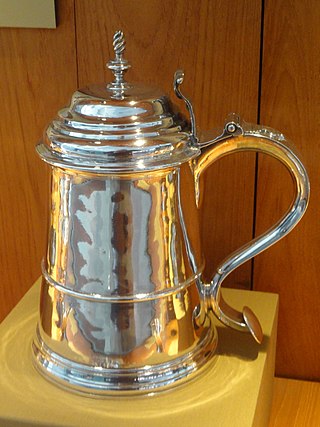
Daniel Henchman was a noted colonial American silversmith, active in Boston, Massachusetts. He was born in Lynn, Massachusetts as the son of Rev. Nathaniel Henchman, apprenticed to silversmith Jacob Hurd, and married Elizabeth Hurd on March 20, 1753. Henchman advertised in the Boston Evening Post, January 4, 1773, and again in the New England Chronicle for June 12, 1773: "Daniel Henchman Takes this Method to inform his customers in Town and Country That ... he makes with his own Hands all Kinds of large and small Plate Work, in the genteelest Taste and Newest Fashion, and of the purest Silver; and ... he flatters himself that he shall have the Preference by those who are best Judges of Work, to those Strangers among us who import and sell English Plate to the great Hurt and Prejudice of the Townsmen who have been bred to the Business... Said Henchman therefore will engage to those Gentlemen and Ladies who shall please to employ him, that he will make any kind of Plate they may want equal in goodness and cheaper than they can import from London, with the greatest Dispatch."

Lewis Cary was an American silversmith active in Boston.

Joseph Edwards Jr. was an American silversmith, active in Boston.

Joseph Foster was an American silversmith, active in Boston.
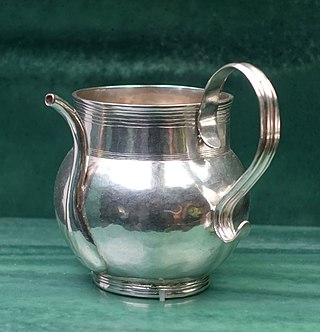
Samuel Haugh was an early American silversmith, active in Boston. Only three of his works are known to survive: two cups and a spoon.

William Homes Jr. , sometimes spelled William Holmes Jr. , was an American silversmith, active in Boston. He was the son of William Homes.
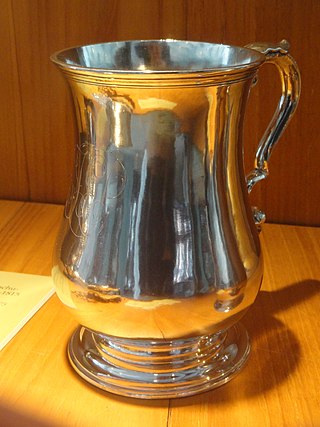
Joseph Loring was an American silversmith, active in Boston.

Daniel Parker was an American silversmith, active in Boston.

Saunders Pitman, also known as Sanders Pitman, was an American silversmith, active in Providence, Rhode Island.

Apollos Rivoire, often known as Paul Revere I, was a French-American Huguenot silversmith, active in Boston. He was father to Paul Revere, the famous American silversmith and patriot.

Joseph Richardson, Jr., was a noted American silversmith, active in Philadelphia.

Nathaniel Richardson was an American silversmith, active in Philadelphia.

Samuel Edwards was an American silversmith, active in Boston.

William Swan was an American silversmith, active in Massachusetts.
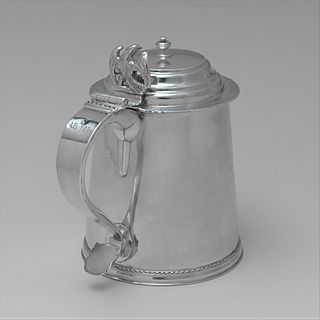
Samuel Vernon was an early American silversmith, active in Newport, Rhode Island.
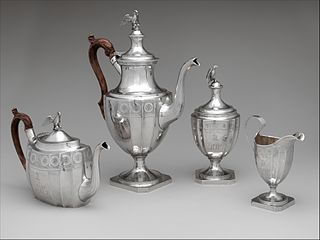
John Christian Wiltberger Sr. was an American silversmith, active in Philadelphia.

Jacob Hurd was a leading American silversmith, active in Boston, and father to silversmiths Nathaniel Hurd (1729-1777) and Benjamin Hurd (1739-1781), as well as grandfather to Benjamin Hurd Jr. (1778-1818).




















